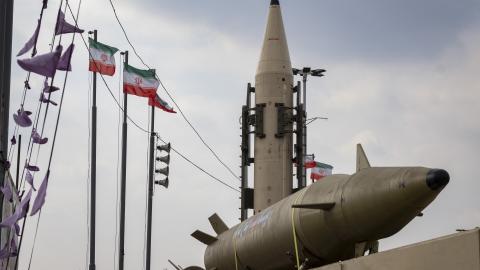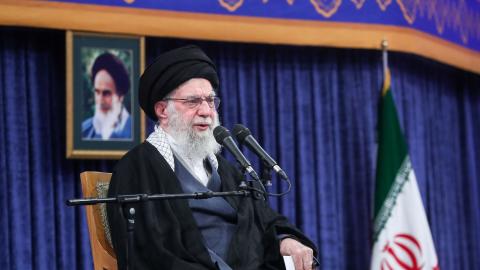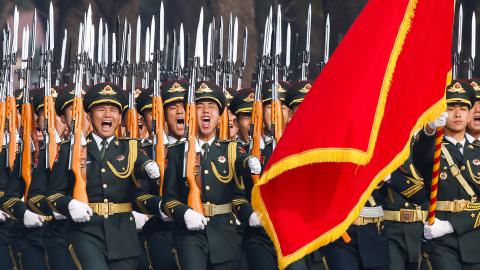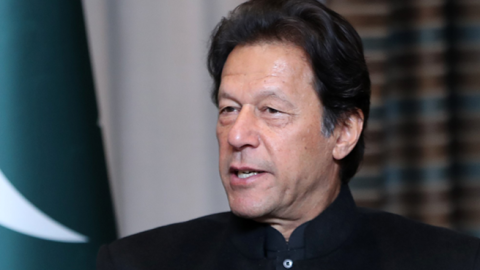p(firstLetter). Prime Minister Imran Khan’s statement that Pakistan does not have use for militant Jihadi groups anymore comes at a time when Pakistan faces blacklisting by the international terrorist-financing watchdog, the Financial Action Task Force (FATF) and must be taken with a pinch of salt.
If his comments in a New York Times interview have the blessing of Pakistan’s all-powerful military, they cannot be trusted any more than the previously broken promises on the subject. If, however, Khan said what he said without clearing it with army chief General Qamar Bajwa first, Pakistan’s politics is about to take another interesting turn.
Just three years ago, the Pakistan army had taken offence over former Prime Minister Nawaz Sharif telling them to act against militants and leaking the civilians’ views to a Pakistani newspaper. The so-called Dawn Leaks instigated Sharif’s battle with the military that led to his eventual removal from office.
The army was not only angry over Sharif’s suggestion that Pakistan risked global isolation over its support for Jihadi terrorists, it also put pressure on the newspaper that reported Sharif’s views and finally forced the journalist who reported it to stop writing his weekly column.
What Sharif’s aides had told Dawn, the Pakistani newspaper associated with the country’s founder Muhammad Ali Jinnah, is almost identical to what Khan has now said to the New York Times. If the army had bristled at the suggestion under Sharif that across-the-board action against militants was necessary, it would balk at it now as well.
There is little change in Pakistan’s attitude towards militancy, particularly the one directed against Afghanistan and India. Pakistan failed to initiate any action against Jaish-e-Muhammad or its leader, Masood Azhar, after the Pulwama terrorist attack across the Line of Control in Jammu and Kashmir in February this year.
Islamabad’s close ties with Beijing were invoked to ensure that Azhar’s designation as a terrorist by the United Nations was blocked by China at Pakistan’s behest. Foreign Minister Shah Mehmood Qureshi publicly argued that Azhar was ill and could not be arrested, and that there was no “solid” evidence against him anyway. Such moves hardly reflect a change in Pakistan’s 30-year policy of supporting Jihadis for influence in the region.
Some might argue that the army’s anger over ‘Dawn Leaks’ was less about the proposed policy but more about embarrassment caused by acknowledging Pakistan’s past support of terrorism in the media. If that was the case, Khan’s latest comments to an international media outlet represent a bigger mea culpa than what Dawn had published in 2016.
Just as Sharif’s government felt then, Khan’s government fears terrorism-related international injunctions. Pakistan’s economy is already on the brink, with a crashing stock market, stagnant exports, low revenue collection, and mounting debts. Further FATF sanctions would only make Khan’s only economic option – more borrowing and financial bailouts by other countries and IMF – more difficult.
“We can’t afford to be blacklisted,’’ he told the New York Times before declaring that “We have decided, for the future of our country — forget the outside pressure — we will not allow armed militias to operate anymore.’’ Khan also acknowledged that “The Pakistan Army created them,’’ while talking about the militants –something the army does not like being said.
But the army might forgive the slight if the purpose of Khan’s remarks is to set the stage for a new global public relations offensive aimed at convincing a sceptical world that this time, finally, Pakistan is about to change course. The FATF’s demands regarding compliance with the global terrorist-financing regime are a real and present danger and the army will swallow its pride to see that danger pass. It would not be the first time Pakistan’s establishment has tried to fend off international pressure over its Jihadist policies with promises of action.
Gullible western reporters and diplomats, convinced that optimism is a form of strategy, have applauded Pakistan’s ‘initiatives’ to shut down militant training camps, detaining extremist leaders, and reforming madrasas on many occasions, especially since 2001. Not everyone checks the historical record and there are always new interlocutors who are unfamiliar with the fate of earlier promises of change and reform.
Pakistan’s support for militancy is motivated by the desire to provide a force multiplier for a relatively poor country trying to act as a major regional power without resources comparable to its perceived rival. Pakistan is an ideological state and is unlikely to change without questioning the state ideology.
But for some in the West, the notion that “surely they must have understood by now that they need to change” often overrides the lessons of history. General Pervez Musharraf was deemed secular by the New York Times’ Celia Dugger because he attended a Roman Catholic School and had dogs as pets. Now the same paper’s Jeffrey Gettleman seems wowed by Imran Khan, “a cricket star and A-list celebrity”.
Take Khan’s promise in his interview that his “new crackdown [on militants] would go far deeper than previous ones criticized as cosmetic. The government, for instance, plans to send 200,000 teachers to religious schools across the country to teach secular subjects like English and math” as part of its effort to “deradicalize students.”
The promoters of Khan as potential reformer ignore the fact that similar plans have been announced amid much fanfare in Pakistan since 2002, only to fail after sinking millions of dollars in foreign aid. Moreover, Pakistan’s militants are not all produced in religious schools and the curriculum of public schools is, in some cases, as radical and inculcates as much hate as what Mullahs might teach their students in a madrasa.
As for the study of English and Math as tools of deradicalisation, Khan, and those willing to believe his latest promises, forget that many prominent Jihadi terrorist leaders were trained as engineers or doctors. If learning English and Math did not deter Osama bin Laden from becoming a terrorist, how will it change things for children brought up on a national ideology that fosters militancy?



















